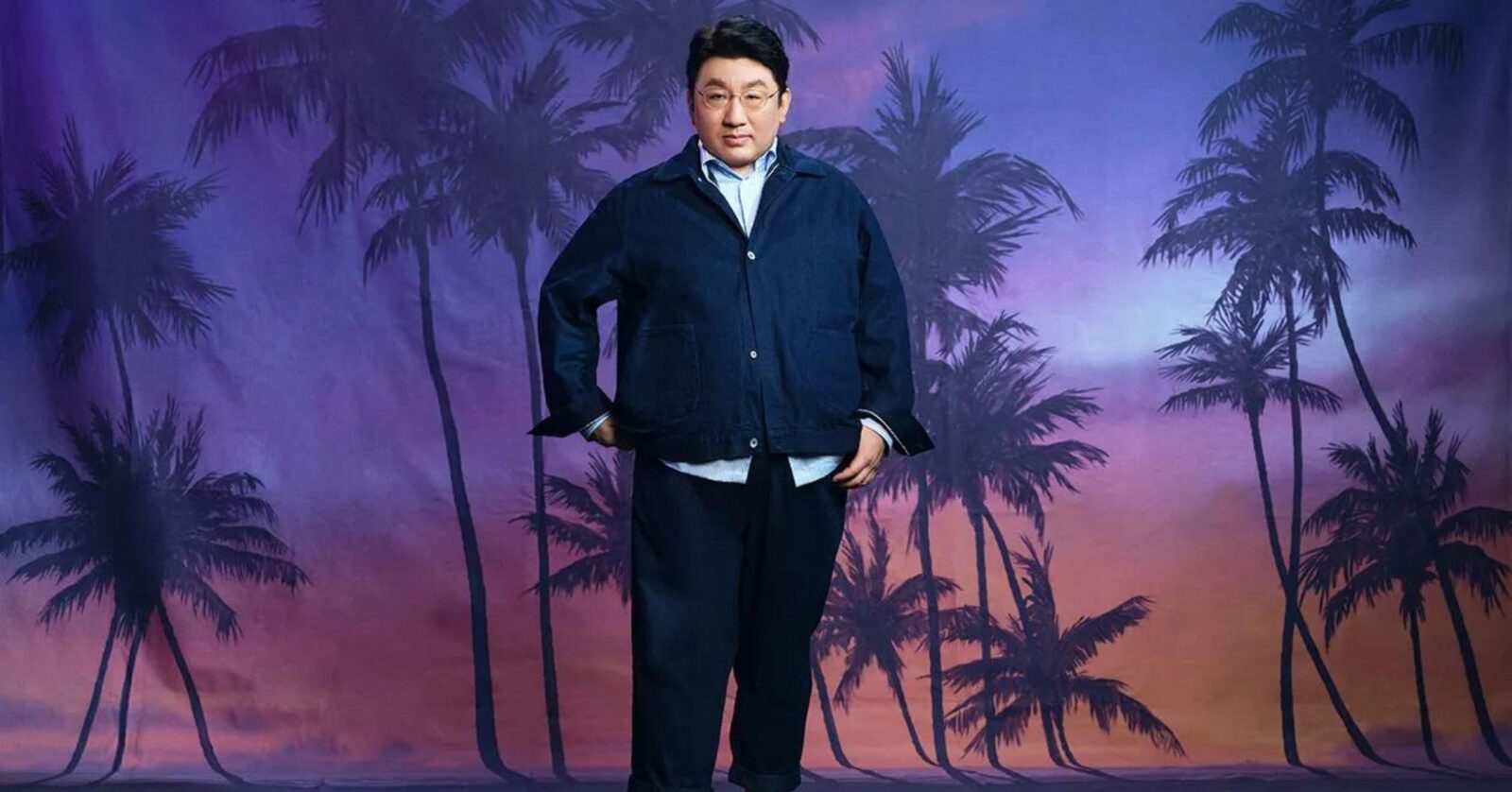In March, as he weighed a takeover of one of his company’s biggest rivals, SM Entertainment, Bang Si-Hyuk decided he could use some privacy.
So to gather his thoughts, HYBE’s 50-year-old founding chairman shut himself in at his house in Seoul, stopped taking calls from friends outside his inner circle and made a careful list: all the pros and cons of making a potential move he long dreamed of that would bring the world’s most popular boy band, BTS, under the same roof as dozens of Korea’s biggest artists such as NCT DREAM, SuperM and aespa.
“After several days of being alone, taking stock of everything, I reached out to my mentors that I usually seek advice from — and to be honest, they opposed the idea,” Bang recalls on a recent Friday in his Seoul office, a modest space equipped with a guitar, a whiteboard and a single window, tucked amid a maze of recording studios. After hearing those concerns, he says, he recalculated that pros-and-cons list, but still pressed ahead. “I personally tend not to attach too much emotion to business affairs,” he continues, “but there was quite a bit of backlash coming from inside of our company, so that was the more challenging part for me.”
The opportunity had come about in February, while Bang was in Los Angeles finalizing a very different blockbuster deal — the acquisition of Atlanta hip-hop label and management firm Quality Control for $300 million. Running on little sleep as he worked across two time zones, meeting with his new U.S. partners by day and talking with colleagues in Korea at night, it was amid all this frenzy that SM’s ousted founder and famed record producer, Lee Soo-man, surprised Bang with an offer to sell HYBE most of his 15% stake in SM, spurring Bang and his board to accept and pledge they would buy another 25% of SM to become its largest shareholder. But HYBE ultimately abandoned its takeover bid after Korean internet giant Kakao made its own, much richer offer. Now, Kakao controls SM instead.
Weeks later, casually clad in a black T-shirt and his signature spectacles, sipping cold corn-silk tea, Bang exudes remarkable calm — especially for a multibillionaire who has just retreated from a high-stakes corporate battle that leaves SM a much more threatening competitor and one with equally ambitious plans to expand in the United States and beyond. “At this point, I’m quite satisfied with the result,” he says.
In part, that’s because HYBE will now pocket around $87 million in profit from the sale of its SM shares it bought in February. But Bang also notes that his mentors (whom, per Asian tradition, he declines to name) had warned him about making such an expensive bet in a period of economic volatility — and as Silicon Valley Bank collapsed the day after HYBE withdrew its bid for SM, he felt assured that they were right.
Welcome to the action-packed life of the man who’s reshaping the music business one megadeal at a time. Whether forging alliances with global record labels and management giants or shopping for gaming and technology companies that will help HYBE better monetize the passion of its artists’ fans, the idea is to grow beyond K-pop, which is, as some see it, in crisis.
Despite the swelling cultural influence of K-pop’s multiplying stars, Korea’s K-pop exports have actually been declining since 2020. There was 53% less K-pop on the Billboard Hot 100 in 2022 than 2021, and K-pop consumption is inexplicably shrinking in Southeast Asia, trends that “are alarming for those on the front line,” Bang lamented in a March speech at a Seoul conference that outlined a three-pronged plan to strengthen K-pop’s future. (Step one: grow K-pop’s global influence by acquiring foreign companies like Quality Control. Step two: structure operations that can “consistently produce superstars.” Step three: expand platforms to monetize fan-artist interaction like HYBE’s Weverse, an app that’s now introducing an array of new features including direct messaging, special badges to reward fan activity and a digital currency called Jelly.) “I think it’s time for us to have a sense of urgency,” he said.
Bang founded Big Hit Entertainment as an agency in 2005 and engineered the debut of BTS a decade ago, assembling the band, writing and producing its music, and overseeing everything from its marketing to social media content, though success came slowly. Determined to break the act in the U.S. market after struggling to do so in Korea, he brought the band to the 2017 Billboard Music Awards to accept the Top Social Artist award and was touring stadiums around the world with it soon after, helping the band crank out half a dozen No. 1 hits on the Hot 100 before the members announced last year that the group would take a temporary break so they could complete their mandatory military service. But he has only recently become a familiar face in the U.S. music business himself: He had just a handful of Zoom calls with Scooter Braun before buying his Ithaca Holdings for over $1 billion in 2021, pushing Braun’s net worth above $1 billion as well, according to Billboard’s calculations.
“His vision changed my life,” says Braun. (Braun had already sold Taylor Swift’s catalog to Shamrock Capital for a $265 million profit after buying it at a $140 million valuation as part of his $330 million Big Machine Label Group acquisition in July 2019. By the time Braun sold Ithaca to HYBE, the price of master recordings had ballooned, thanks to the initial public offerings of Warner Music Group in 2020 and Universal Music Group in 2021, as well as Tencent Music Entertainment’s investment in UMG, netting Braun close to $400 million in profit on the rest of Big Machine.) After the deal closed, on Braun’s first visit to Seoul, he bought Bang and the entire senior executive team Panerai watches, the same model he bought for his own team in the fanciest watch shop he could find in Atlanta’s Lennox Mall two decades ago to celebrate the first hit by his then-client Asher Roth. People “think I’m going to check out at any moment, but I am working my butt off because of that man,” Braun continues. “I believe he’s going to find a way to build something really spectacular.”
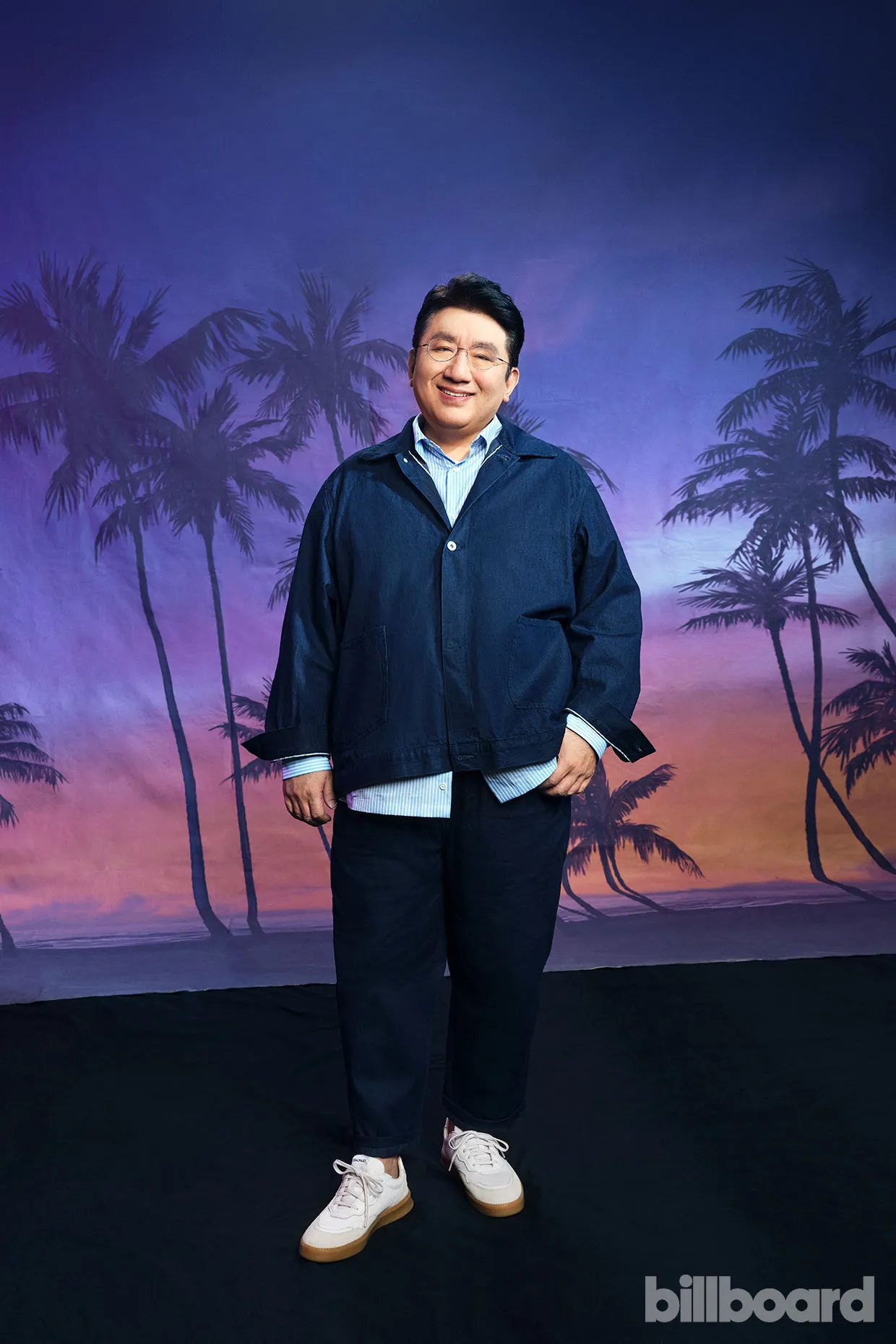
Jessica Chou
In 2021, HYBE announced a strategic global partnership with UMG, splitting with Sony’s Columbia Records (which had released BTS’ six No. 1s) after UMG chairman/CEO Lucian Grainge and Interscope Geffen A&M chairman/CEO John Janick had gotten to know Bang through their own regular Zoom meetings over the course of the pandemic. HYBE and Geffen announced auditions for a U.S.-based group to be modeled on K-pop’s training and development system and developed by UMG’s Geffen Records (initially planned as a boy band but now in development as a girl group), and UMG said it would explore enhanced direct-to-fan communication for its artists through HYBE’s Weverse platform.
But for all his business savvy, Bang remains a creative at heart and still writes and produces: He’s currently in and out of the studio working on new tracks and visuals for ENHYPEN, TOMORROW X TOGETHER and &TEAM.
When Quality Control’s founders, Kevin “Coach K” Lee and Pierre “P” Thomas, first met Bang for dinner at his home in Los Angeles, they discussed the process of putting together Lil Yachty’s Let’s Start Here without using a single sample. “He was really intrigued by the production — he knew it, he’d checked it out. He’s a producer,” recalls Lee, who is preparing with Thomas to make their first visit to Korea in May (he has already mastered “hello” in Korean) and keeping in touch with Bang in the meantime on a HYBE-QC WhatsApp group chat. Thomas was taken with Bang’s joyful energy and notes that “he knew a lot about our culture and our artists — he had done his homework.”
Nile Rodgers, who worked with Bang to produce LE SSERAFIM’s first studio album, says that while Bang is recognized all over the world as the mastermind behind HYBE and BTS, “what many people don’t realize is that he’s an amazing guitarist and songwriter. The way he used Morricone’s The Good, The Bad and The Ugly theme in our collaboration on LE SSERAFIM’s new single ‘Unforgiven’ demonstrates his musical genius.”
And while it’s hard to entirely avoid the grind that comes with international deal-making, Bang avoids sticking to the type of schedule a typical record company chairman might keep.
“Many people say that routines can help you be more productive, but I enjoy relaxing [and being] as lazy as I can — I feel like having a set routine on top of an already busy schedule will take away my time to goof off,” Bang says, noting that his ideal version of laziness involves reading books and comics and swimming when he’s in Los Angeles. “At times, I doze off when I get sleepy.”
From his office building, whose airy rooftop cafeteria overlooks Seoul’s Han River and the sprawling city beyond it bursting with cherry blossoms, Bang talks at length through a translator (he speaks English to American colleagues with whom he feels comfortable, but prefers giving interviews in Korean) about the future of K-pop and his vision for global domination.
Korea’s music exports to Southeast Asia — one of K-pop’s most crucial markets — dropped 30% in 2022, and in Indonesia, the world’s fourth most populous country, K-pop’s share on Spotify’s charts fell 28%. Why is K-pop’s growth slowing?
The fact that BTS is currently not active has an impact. When you look at the surveys regarding awareness, when you compare K-pop’s penetration and BTS’ penetration in the global market, BTS tends to have more penetration than K-pop itself. But when it comes to the sluggish growth of K-pop in the Southeast Asian market, I think there must be a particular reason. Perhaps there has been a small change in their preferences in terms of pop culture consumption, or maybe they are now seeing other cultural content. Our company is not so sure now. We’re doing active research into it.
Now that you’ve planted your flag in hip-hop with the acquisition of Quality Control, you’ve said you’re focused on finding partners in the Latin music business. How is that going?
We’ve been meeting with many companies and founders since last year. And we will need to find ways to adapt to make boy groups or girl groups work in those markets.
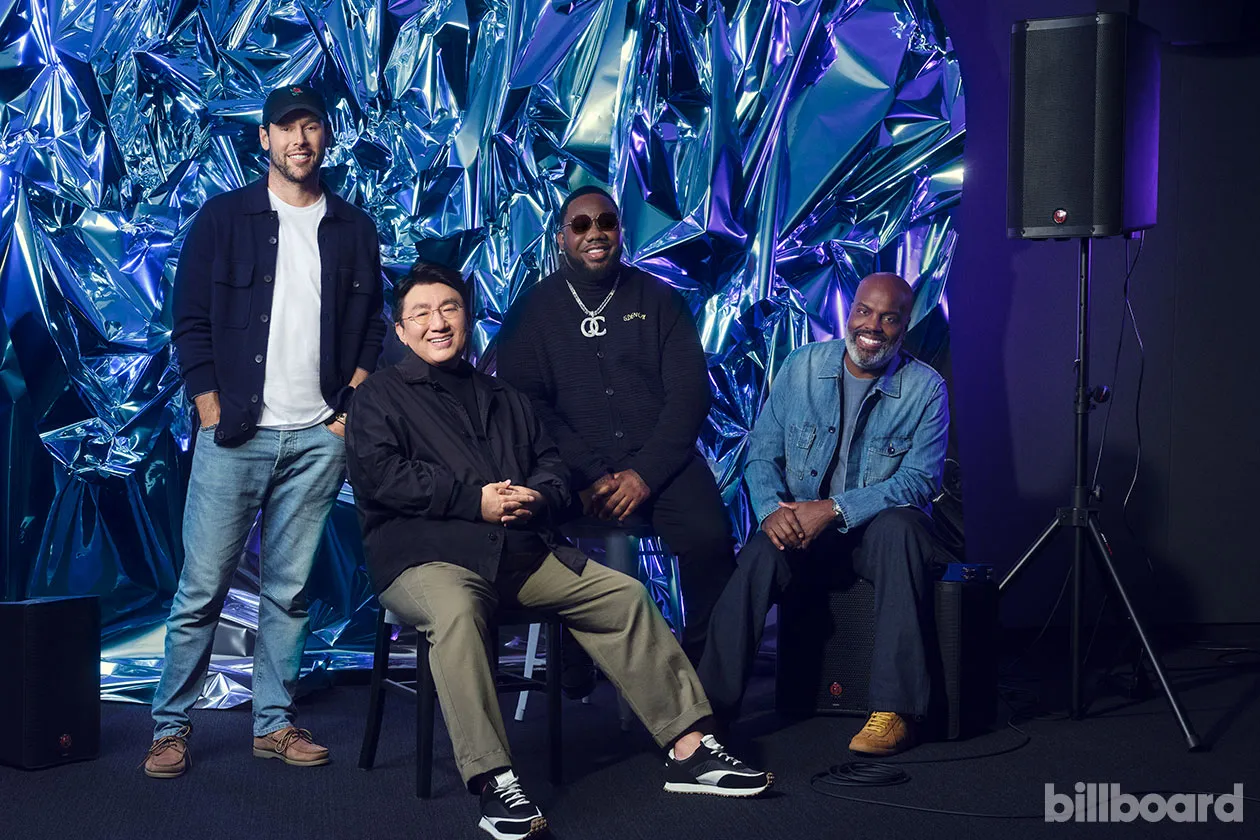
From left: Scooter Braun, Bang Si-Hyuk, Pierre “P” Thomas and Kevin “Coach K” Lee photographed at HYBE America in Santa Monica, Calif. Braun Grooming by Christina Guerra.
Jessica Chou
So when you acquire companies that work in other genres, the idea is to apply the Korean model to create boy bands and girl groups in those genres?
We don’t plan to necessarily apply the pop methodology to those different genres. What we are trying to do is utilize HYBE’s operation systems as well as technology and acquire the top labels in each genre. We are looking for a synergistic effect. By doing so we seek to improve and increase our presence in the U.S. market. I’m not saying that we plan to create a country music boy group — that’s not what we’re looking for right now. But in pop and Latin music, demand has been already proven for boy bands and girl groups. We’re trying to apply the experience we gained in the K-pop industry and follow the local basic rules of those markets.
Can you replicate the global success of BTS, given that no other K-pop act has come close so far?
If your question is about the possibility of creating an artist like BTS again, the answer is no. However, if you were to ask whether there would be a K-pop artist from HYBE that tops the Billboard Hot 100 chart, my answer would be yes. [Jimin became the first BTS member to achieve this as a solo act on April 3 when his single “Like Crazy” debuted at No. 1.] The experience of managing BTS and operating different labels gave us access to powerful networks, infrastructures and experiences. With these, HYBE can repeat its remarkable results with the help of talented artists.
What other assets are you shopping for?
Our priority is acquiring labels that lead in their genre and management companies that have contracts with top artists based on a solid, trustworthy relationship. As for the gaming business, we are prioritizing attractive [intellectual property], business scale and development capacity. As we look toward metaverse and platform businesses, we plan to acquire more hidden champions in technology.
How do you see K-pop developing outside of the traditional boy bands and girl groups that are currently most popular with U.S. audiences?
K-pop’s uniqueness and strength is in these multimember, single-gender groups. Given that, HYBE is primarily focusing on leveraging its accumulated expertise in managing and producing acts that consist of multiple members, rather than solo artists or mixed-gender groups in K-pop.
For years, boy bands dominated in sales, but now many girl groups seem to be having more success. Can you explain what’s driving this shift — and whether the pendulum will swing back?
I think the success of girl groups is related to the zeitgeist. If you even look at the North American market, there has been noticeable success achieved by female artists in pop and hip-hop. With the strengthening of the girls-support-girls culture, female fans’ support for female artists is growing fast. HYBE has been locking steps with the trend by acquiring SOURCE MUSIC three years ago and launching a new label, ADOR. As a result, we are proud and happy to have introduced outstanding girl groups such as LE SSERAFIM and NewJeans.
We will have to keep an eye on the situation as to whether girl groups will ever surpass boy groups in terms of revenue. I’d love to see girl groups generating as much revenue as boy groups. The streak of success of girl groups just opened its first chapter, and they are yet to generate revenue that is comparable to those of the boy groups. And there’s no definite correlation between artists gaining popularity and fandoms’ willingness to spend money.
K-pop’s fans are passionate about purchasing merchandise and physical albums. Why doesn’t that enthusiasm manifest itself to the same degree on streaming platforms?
I do not want consumption patterns rearranged around streaming platforms. K-pop artists have created a more effective revenue model. I hope to continue our current growth while expanding our share on streaming platforms, but we do not need to create a dedicated strategy from the business point of view. NewJeans broke into the Billboard Hot 100 chart without any offline promotion activities in North America, and LE SSERAFIM is growing its audience on Spotify at an astonishing rate.
Do you think you can build fan armies as organized and dedicated as K-pop’s for artists in other countries and genres?
I believe that companies and artists can cultivate a large fan base by responding to the needs of the fans, but they cannot organize or shape the fandom.
In a recent speech in Seoul, you said that “K-pop is like a David in front of three major companies that resemble Goliaths in the global market,” and that to increase K-pop’s bargaining power against these global distributors, “we need to reach a certain level of scale.” Do you see the major record companies more as competitors than partners?
I never thought those companies were our competitors. I only view them as partners. I’m not saying this just because Lucian might read my answer. (Laughs.) Having more market share is actually not that meaningful to me. Gaining more market share would require acquiring more labels and incurring a lot of operation costs as well. In order to pay for that, the company might need to slow down on other parts of the business, and they will require just too much time and effort to do so. That’s not what we are going for. Our company is a music-based lifestyle platform company. By applying the experience and systems and technology from our K-pop business, we would like to increase the size and the influence of our company in the global market. It would be an exaggeration for me to say that we don’t care at all about our share of the global music market, but that’s not the critical matter.
The amount of music being uploaded to streaming services is increasing exponentially, which squeezes everyone’s market share. Does that concern you?
As of now, when I think about our company’s position, we do not feel threatened by the increase in the amount of music or the number of suppliers or producers. K-pop’s market size is so small that we still have room for growth. We are more in a position of the challenger in the market. Media is becoming very personalized, and there is a greater diversity in people’s tastes. So it’s unlikely that the market for K-pop will shrink because of an increase in the amount of music.
You also said that more negotiating power could get you better distribution deals, “which will help improve the company’s financial performance and enable the company and our artists to grow.” Why not just distribute your own content?
My belief is that it’s better to have experts do what they’re really good at and then pay the royalties. The three major companies are already doing really well in what they’re doing. Rather than doing it ourselves, it would be much better for us to improve our bargaining power with them and then decrease [the cut we pay them for distribution]. That’s more profitable and better for us.
Your company is growing very fast. What is that like after having run such a tight-knit operation for so long?
Rapid growth is a blessing, yet it comes with great dilemmas. The moment a rapidly growing company sees sluggish growth, it has more impact than it would at a typical company. The growth rate should be flexible according to the changes in the environment, but rapidly growing companies do not have the liberty of adjusting.
From an employee’s perspective, rapid growth of a company may impact their quality of lives. Working at HYBE is like being on the back of a flying rocket, or as we say it in Korean, “getting on the back of a running tiger.” As long as the employees endure the speed, they will grow with the company. But if the speed and change become overwhelming, they might fall off. Everyone is desperate to stay up to speed. This may sometimes cause pain to some employees.
From a corporate culture perspective, the rapid influx of new employees makes it very difficult to maintain HYBE’s culture. HYBE continues to make an effort to hold and share a set of values that are relatively well-organized and realistic. Despite these efforts, it is not always easy to keep everyone under an umbrella of homogeneous values when the workforce doubles almost every year. Especially during the pandemic, it was painful for me to watch our corporate culture break down since there was so little face-to-face interactions and we had to work virtually.
Now that things have normalized to a certain extent, it’s time to start looking forward. We are looking to revamp our corporate culture to meet our current needs, making employees’ lives more fulfilling. The reason that HYBE’s corporate culture has kept its homogeneous value is because it is based on common human values. We believe when talented people who are enthusiastic about their work collaborate freely in a responsible manner, their shared belief will allow both the company and the employees to achieve mutual growth.
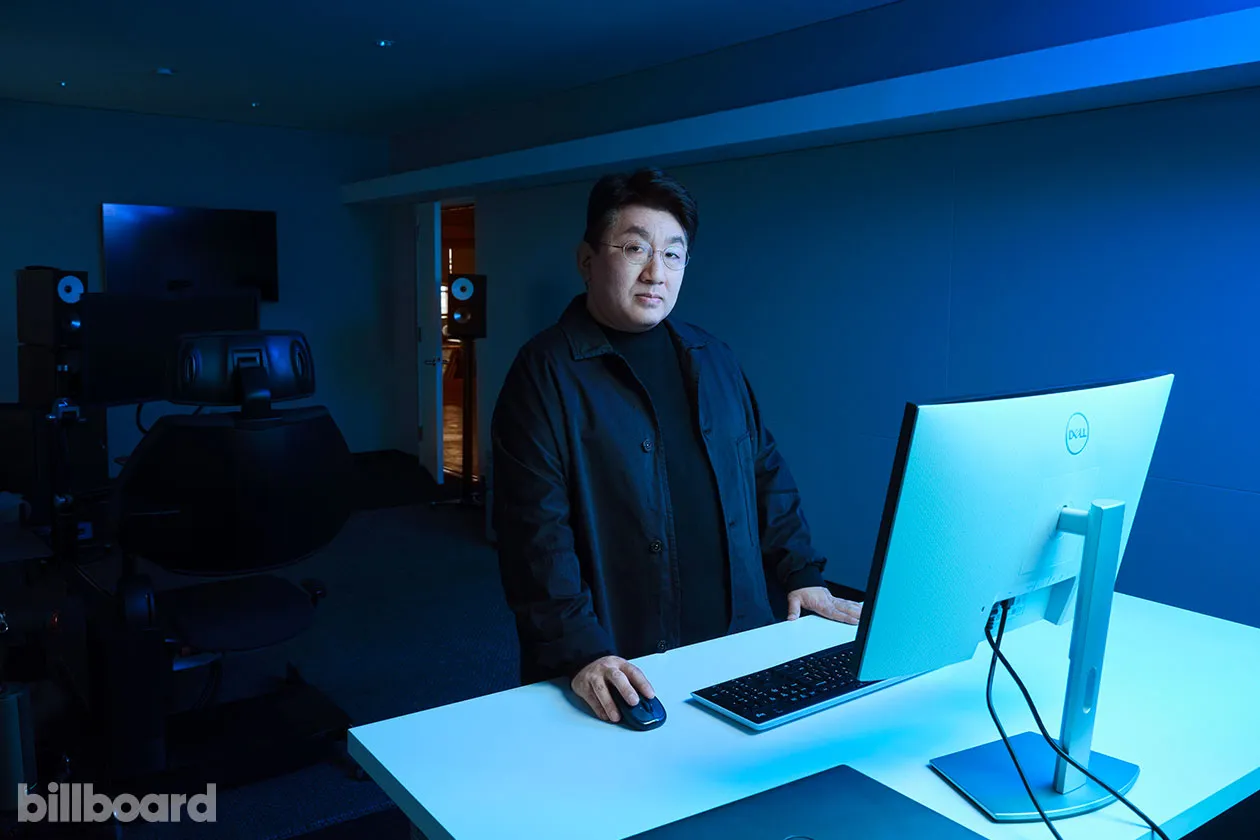
Jessica Chou
You talk a lot about the importance of the “solution” business, which refers to what we know in the United States as 360 deals, agreements that give record labels a stake in all of an artist’s revenue streams. Will you be able to strike those types of deals as you expand beyond K-pop?
I think in markets like Japan, where there’s already an established system for solution business, we are going to speed up and accelerate our solution business. However, in markets like the United States, we may have to take a different approach.
Some catalog buyers are now securitizing the rights to the music they own so that fans can invest in their favorite songs and artists. Is that something you will offer on your Weverse platform?
I used to think of catalogs as assets — they are very similar to selling or buying bonds — so I was not interested in that at all. And considering the high volatility in the economic situation, the values of catalogs as assets are actually decreasing. However, catalogs could be really powerful securitized products for HYBE. Of course we’re interested in that sort of business. We are considering some ways to go about that. But under securities law, there’s nothing more I can share now.
How are you preparing HYBE for the rise of generative artificial intelligence?
I have long doubted that the entities that create and produce music will remain human. I don’t know how long human artists can be the only ones to satisfy human needs and human tastes. And that’s becoming a key factor for my operation and a strategy for HYBE. We were able to acquire a company, Supertone, that can clone voice completely. Not just tone, but also intonation. So for example, we can record your voice and then put or apply Angelina Jolie’s intonation or her speech and make it into a completely different voice. And this technology can also replicate the character of a person, in any language. You can make the voice older or younger. Currently we’re running some small-scale projects with this company, and one of them is scheduled to be published and rolled out in May. Inside our company we call it Project L. It’s still in the pilot stage.
Are you worried that people could use that kind of technology to imitate the voices of BTS members for profit?
Of course, but that doesn’t keep us from pursuing it. I believe regulations and institutions must be put in place and social consensus [around AI] should be made as soon as possible. Recently, Hollywood’s Writers Guild of America drafted a document to handle AI writing scripts. Rather than keeping AI from writing scripts or not using AI, I believe it is a more appropriate to respond to such change in society.
What is your working relationship like with Scooter Braun?
We bring a lot of personal intimacy, trust and empathy to work. There are of course disagreements sometimes, but our shared fundamental beliefs allow us to move toward our common goals. Scooter, as we all know, is extremely agile at work. I, on the other hand, tend to be more cautious, contemplating deeply to find the optimal solution. I believe this difference allows us to achieve the best possible outcome for the company with the help of trusted employees.
The best thing about Scooter and I working together is that we don’t need a lot of words to describe our mutual trust. Even though he and I have built our careers on different continents, our visions for the future, our attitudes toward artists and our philosophies on life are so similar that sometimes we get things done through trust, even beyond language barriers.
Who are some global music executives or creatives you still haven’t met that you’re most interested in working with?
Scooter is leading HYBE’s U.S. business, and I trust him so much that I’m happy to meet with the people recommended by him. Among creators, I would like to meet Pharrell Williams. Jimmy Iovine has introduced Pharrell to me and we exchanged greetings over text. When he became the creative director of Louis Vuitton, I sent him a congratulatory message. But I haven’t had the chance to meet him in person yet.
Which artists have you gotten to meet?
I first met The Kid LAROI in the studio when he was working on “Stay.” Since then, we had occasional video calls, and I’ve been to his show. I like him as a person and respect him as an artist. When HYBE first acquired Ithaca Holdings, I was telling Scooter that I would love to work with The Kid LAROI, and I remember how pleasantly surprised I was when Scooter told me he was about to sign him. I’ve had a few video calls with Justin Bieber and Ariana Grande but not in person yet. I haven’t had the chance to meet other HYBE America artists.
Honestly, I don’t think it’s a must to meet artists. HYBE acquired trustful management and labels who have built strong mutual trust with their artists, so my meeting with them would not necessarily add value. I have open arms if any of the artists request a meeting or ask advice, but I don’t think I will initiate sit-downs with artists.
It goes the same for all artists under HYBE labels in Korea. Other than BTS, who have shared a lot of intimate memories with me ever since they were young, I only sit down or meet artists upon their requests since all of them have a strong, trusting relationship with the leaders of each respective label.
Talk about your touring and concert promotion business. Is that an opportunity for growth?
HYBE’s concert business office is a business organization that not only plans, produces and performs concert content, but also operates as an agency and a promoter. This sets us apart from other tour production companies and promoters. We produce content based on a high-level understanding of the artist, providing an immersive experience to the audience with consistent messaging. We have the capacity and experience to plan and produce shows at various scales, ranging from small stages to stadium concerts. We are planning to expand collaboration with HYBE Japan and HYBE America, and we also aim to further expand our concert and touring business in their respective regions.
We have been discussing whether to develop an in-house ticket business since early 2018, and there is still room for discussion. With the development of technologies such as [non-fungible tokens], HYBE is on the lookout for changes as major shifts are expected in the ticket industry.
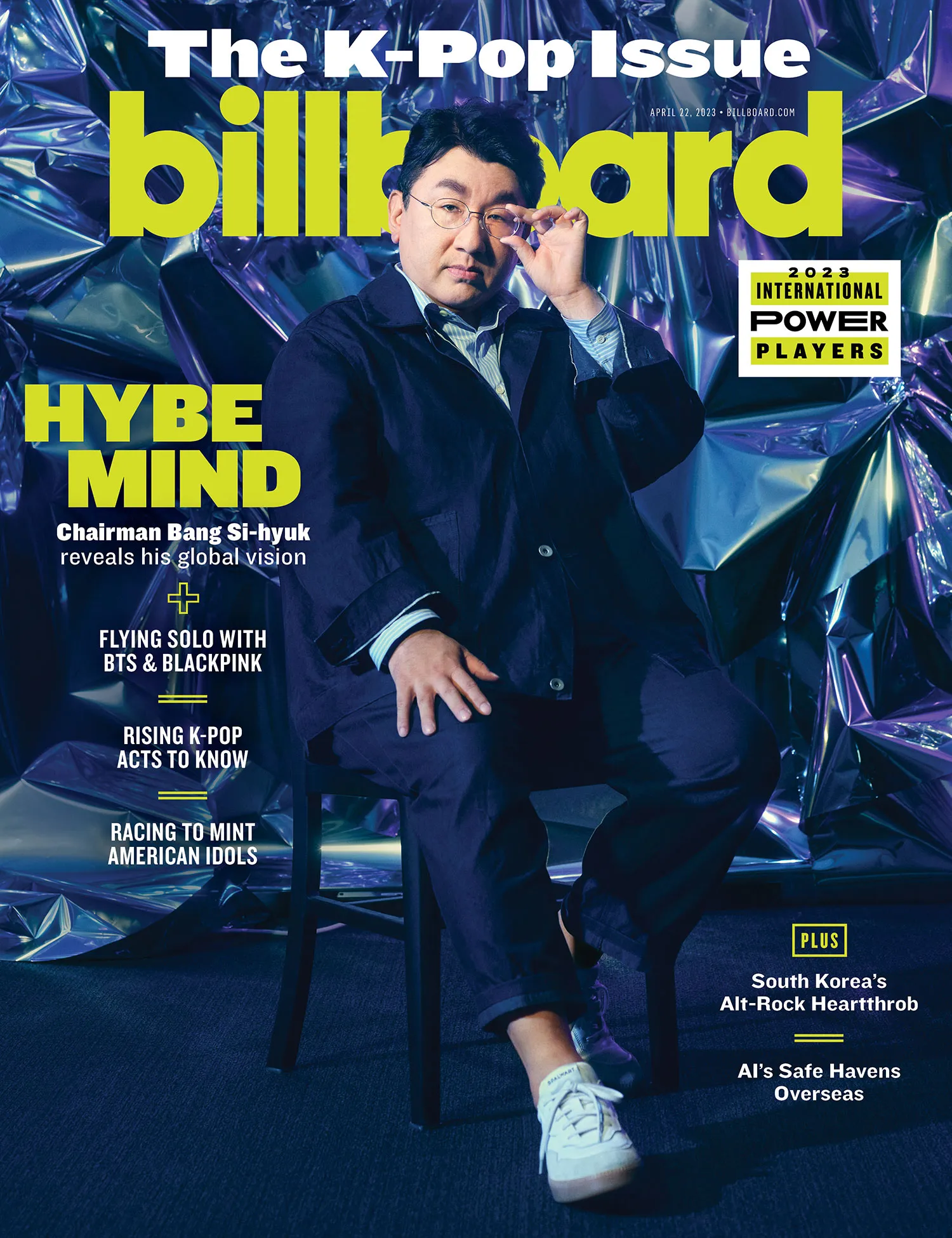
You said in your recent speech that “These days, whether it’s five or 10 years from now, I’m putting a lot of effort into preparing for what comes after Bang Si-Hyuk — someone who can take over my role in the company.” When that eventually happens, what will you do next?
I’m not at liberty to think about retirement since I have a lot on my shoulders. It seems premature to start thinking about retirement. If I were to stay in the industry, I’ll either have to pursue a role in this company until I’m very old or leave to start another company, neither of which are likely. If there is a completely different option, I might consider pursuing it.
This story originally appeared in the April 22, 2023, issue of Billboard.

